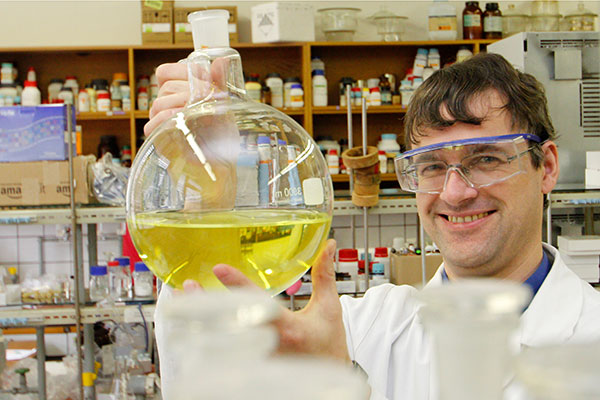Mit Hilfe verschiedenster Enzyme aus der Natur lassen sich chemische Produktionsprozesse vereinfachen und umweltschonender gestalten. In diesem innovativen Forschungsbereich, der so genannten Biokatalyse, leistet Univ.-Prof. Dr. Wolfgang Kroutil an der Karl-Franzens-Universität und am ACIB – Austrian Center of Industrial Biotechnology – in Graz richtungweisende Arbeit. Für seine herausragenden Leistungen erhielt der Chemiker den prestigeträchtigen Biotrans-Award. Der erstmals vergebene Preis wurde im Rahmen der zwölften internationalen Biotrans-Konferenz am 30. Juli 2015 in Wien verliehen.
Wolfgang Kroutil kann mit seiner Arbeitsgruppe auf viel beachtete Forschungserfolge verweisen. So haben die WissenschafterInnen in den letzten Jahren unter anderem nachhaltige Verfahren entwickelt, um Polymerbausteine für Spezialkunststoffe herzustellen. Dabei werden nachwachsende Rohstoffe wie Zucker und Fettsäuren als Ausgangsmaterial verwendet.
In Kooperation mit einem österreichischen Unternehmen wurden außerdem effizientere Methoden für die Erzeugung von Medikamenten entwickelt. Diese betreffen etwa Elvitegravir, das bei HIV zum Einsatz kommt, und Silodosin zur Therapie von Störungen beim Harnlassen durch Prostata-Vergrößerung. Weitere Beispiele sind Ramatroban für die Behandlung von koronarer Herzkrankheit und Asthma sowie Rivastigmin gegen Alzheimer.
Im Bereich des Pflanzenschutzes haben die ChemikerInnen der Uni Graz die bislang effizienteste Methode zur Herstellung eines natürlichen Antifraßmittels für Fichten gefunden. Als Vorbild dient ein Wirkstoff aus Pinien.
Wolfgang Kroutil leitet eine Arbeitsgruppe am Institut für Chemie der Karl-Franzens-Universität Graz und ist stellvertretender Leiter des Bereichs „Biokatalyse“ am ACIB. Seine Forschungen sind in nationale und internationale Kooperationen eingebunden sowie in den universitären Schwerpunkten „Molekulare Enzymologie und Physiologie“ sowie „Umwelt und Globaler Wandel“ verankert.
Aktuell forscht der Chemiker noch bis Mitte September 2015 in den USA, wo er sich mit dem Einsatz von Computerprogrammen zur Entwicklung und Verbesserung von Biokatalysatoren beschäftigt.
Die Biotrans-Konferenz ist der größte Kongress im Bereich Biokatalyse. Seit ihrem Debüt 1993 in Graz findet sie alle zwei Jahre statt.
Der Biotrans-Award zeichnet WissenschafterInnen bis 45 Jahre für besonders innovative Konzepte und wegweisende Forschung auf dem Gebiet der Biokatalyse aus. Der/die PreisträgerIn wird durch ein internationales Komitee bestimmt, das Mitglieder aus der Industrie sowie von Universitäten aus Japan, den USA und Europa umfasst.
